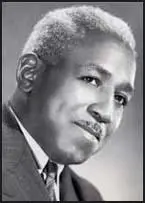George Schuyler

George Schuyler was born in Providence, Rhode Island, in 1895. He enlisted with the United States Army in 1912 and worked his way to the rank of lieutenant.
After the First World War Schuyler moved to New York City where he worked as a labourer before Philip Randolph and Chandler Owen employed him as a journalist on The Messenger in 1923. A member of the Socialist Party, Schuyler contributed to a wide variety of radical journals including Opportunity, Crisis and Nation.
Schuyler eventually become associate editor of the Pittsburgh Courier. He supplied the weekly paper with a regular column and was one of its chief editorial writers. On one assignment he took the Jim Crow tour of the southern states. Books written by Schuyler include The Negro Art Hokum (1926), Slaves Today: A Story of Liberia (1930) and Black No More (1931).
In the Second World War Schuyler criticised President Franklin D. Roosevelt for arguing that the United States was fighting for freedom and democracy. He pointed out that Adolf Hitler and the Nazi Party had been deeply influenced by the racial policies of the Deep South. In one article he argued that "until now the United States has yielded 100 per cent to the same racial theories trumpeted by Herr Hitler."
Although he was quick to point out individual cases of racism in the armed forces, Schuyler believed that African American should do all they could to defeat the Axis powers. He even attacked former comrades such as Philip Randolph when they attempted to bring an end to racial discrimination by actions such as the proposed March on Washington.
In 1943 Schuyler wrote an article on the war for the African American magazine, The Crisis entitled A Long War Will Aid the Negro. Schuyler argued that the war was taxing America's white human resources to the limit and that the armed forces "would have to rely increasingly on blacks to meet its needs and, in the process, would open up to them yet further opportunities for advancement."
During the McCarthy Era Schuyler moved sharply to the right and contributed to American Opinion, the journal of the John Birch Society. In 1947 he published The Communist Conspiracy against the Negroes. His autobiography, Black and Conservative, was published in 1966.
George Schuyler died in 1977.
Primary Sources
(1) George Schuyler, wrote about his time working for Philip Randolph and The Messenger in his autobiography, Black and Conservative.
Philip Randolph was one of the finest, most engaging men I had ever met. Undemanding and easy to get along with, leisurely and undisturbed, remaining affable under all circumstance, whether the rent was due and he did not have it, or whether an expected donation failed to materialize, or whether the long-suffering printer in Brooklyn was demanding money. He had a keen sense of humor and laughed easily, even in adversity.
(2) George Schuyler, Pittsburgh Courier (10th January, 1942)
With sadness and weary resignation I note that many supposedly intelligent Negroes are swallowing hook, line and sinker the same bush-wah at which their fathers snapped during World War One, to wit; that once victory is achieved, the colored brethren as a reward for their patriotic efforts and sacrifices will be promptly invested with all rights and privileges of citizenship now denied them wherever Homo Nordicus rules.
Of course it may be that the black masses's scepticism is unwarranted and that the phonograph Negroes are correct. Maybe peace will see an end to the discrimination and insults Negroes suffer under the Stars and Stripes, Union Jack, Tr-color, the banner of Savoy, etc. I hope so. But when I see a great nation like the United States engaged in a struggle for life and still determined to continue and even expand the racial distinction forced upon the whole nation by the fanatically Negrophobic South, I am doubtful, to put it mildly. And unless some changes are made pretty soon in the direction of real improvement, the disinterest of the black masses in the outcome of the current fight for democracy is going to become tremendous.
(3) During the Second World War George Schuyler attacked the political activities of Philip Randolph in the Pittsburgh Courier (1st August, 1942)
Mr. Randolph knows how to appeal to the emotions of the people and to get a great following together, but there his leadership ends because he has nowhere to lead them and would not know if he had. He has the messianic complex, considerable oratorical ability and some understanding of the plight of the masses, but the leadership capacity and executive ability required for the business at hand is simply not there. The original March on Washington move is now admitted to have been a failure else the current agitation would not be necessary.
(4) Thomas Sancton, New Republic (26th April, 1943)
George S. Schuyler is about the best. He is a clear and vivid writer. Sometimes he writes with a mordant sarcasm, but he does not let it unbalance the order of his ideas.
